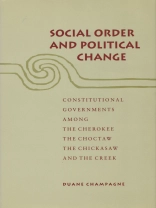Under what conditions can democratic governments be formed and become stable? The author addresses this question in a unique way that brings sociological and political theory to bear on the study of traditional societies, long the preserve of historians and anthropologists. By examining in detail the history of four American Indian societies—the Cherokee, the Choctaw, the Chickasaw, and the Creek—the author documents a general theory of politics and constitutional government. The four societies present an opportunity to study the process of democratic institution building in a controlled, comparative historical context. The societies were subject to similar geopolitical relations with the United States; they were incorporated into the same sequence of world economic system relations (initially fur trade and then the cotton market); they experienced the emergence of class structures; and they all produced some form of constitutional democracy. The Cherokee, however, adopted a stable constitutional government earlier and with less coercion than the other three nations. Why was this so? With the aid of comparative analysis, the author finds the answer in the Cherokee differentiation of politics from the nationally and religiously ordered clan system. This set of institutional relations allowed the Cherokee to maintain a strong sense of social solidarity while tolerating conflict, increased political differentiation, and formation of a political nationality. The other three societies were either less differentiated or less socially unified. They formed their constitutional governments thirty to forty years later than the Cherokee and with more internal political coercion—and, in the Creek case, with less political stability. The formation and stabilization of democratic state governments is a major issue in such contemporary phenomena as political change in Third World nations and the transformation of the governments of Eastern Europe. The four case studies presented in this hook form the basis of a new and powerful theoretical argument for understanding historical patterns of democratic change, political stability, and the relations of political power.
Duane Champagne
Social Order and Political Change [EPUB ebook]
Social Order and Political Change [EPUB ebook]
Buy this ebook and get 1 more FREE!
Language English ● Format EPUB ● Pages 317 ● ISBN 9780804770385 ● File size 1.8 MB ● Publisher Stanford University Press ● Published 1992 ● Edition 1 ● Downloadable 24 months ● Currency EUR ● ID 10098027 ● Copy protection Adobe DRM
Requires a DRM capable ebook reader












